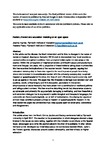Racism, Prevent and education: insisting on an open space
| dc.contributor.author | Haynes, Joanna | |
| dc.contributor.author | Passy, Rowena | |
| dc.date.accessioned | 2017-09-13T16:22:58Z | |
| dc.date.issued | 2017-09-11 | |
| dc.identifier.issn | 1757-8043 | |
| dc.identifier.uri | http://hdl.handle.net/10026.1/9925 | |
| dc.description.abstract |
In this article we first discuss the Brexit referendum and its links to changes in the nature of racism in England, drawing on Burnett’s (2013) work to demonstrate how ‘local conditions, national politics and global conditions’ have prompted violent racism in new areas of the country. Within this atmosphere of heightened tension, anti-Muslim abuse and attacks have risen over the past two years, with a proportion of these incidents taking place in universities. We then examine the implications of the counter-terrorist Prevent agenda, arguing that educators’ statutory duty to ‘have due regard to the need to prevent people from being drawn into terrorism’ is in considerable tension with the university statutory duty to uphold freedom of speech/academic freedom; this ‘duty of care’ effectively requires university staff to act as agents of the state. We argue that this threatens to damage trust between staff and students, restrict critical enquiry and limit discussion, particularly in the current circumstances of sector insecurity that have arisen from a combination of neoliberal policies and falling student numbers. We then examine disturbing trends that characterise students as vulnerable and university life as potentially damaging to well-being, and how these link to anti-extremism dialogue that is expressed in epidemiological and therapeutic language; the vulnerable are framed pathologically, as ‘at risk’ of radicalisation. Developing the argument on how these conditions present a threat to freedom of speech/academic freedom, in the final section we argue that universities must keep spaces open for uncertainty, controversy and disagreement. | |
| dc.format.extent | 155-165 | |
| dc.language | en | |
| dc.language.iso | en | |
| dc.publisher | emerald insight | |
| dc.subject | 16 Peace, Justice and Strong Institutions | |
| dc.title | Racism, Prevent and education: insisting on an open space | |
| dc.type | journal-article | |
| dc.type | Journal Article | |
| plymouth.issue | 4 | |
| plymouth.volume | 16 | |
| plymouth.publication-status | Published | |
| plymouth.journal | Safer Communities | |
| dc.identifier.doi | 10.1108/SC-05-2017-0020 | |
| plymouth.organisational-group | /Plymouth | |
| plymouth.organisational-group | /Plymouth/Faculty of Arts, Humanities and Business | |
| plymouth.organisational-group | /Plymouth/Faculty of Arts, Humanities and Business/Plymouth Institute of Education | |
| plymouth.organisational-group | /Plymouth/REF 2021 Researchers by UoA | |
| plymouth.organisational-group | /Plymouth/REF 2021 Researchers by UoA/UoA23 Education | |
| plymouth.organisational-group | /Plymouth/Research Groups | |
| plymouth.organisational-group | /Plymouth/Research Groups/Institute of Health and Community | |
| plymouth.organisational-group | /Plymouth/Users by role | |
| plymouth.organisational-group | /Plymouth/Users by role/Academics | |
| dcterms.dateAccepted | 2017-08-08 | |
| dc.rights.embargodate | 2018-9-11 | |
| dc.rights.embargoperiod | 12 months | |
| rioxxterms.versionofrecord | 10.1108/SC-05-2017-0020 | |
| rioxxterms.licenseref.uri | http://www.rioxx.net/licenses/under-embargo-all-rights-reserved | |
| rioxxterms.licenseref.startdate | 2017-09-11 | |
| rioxxterms.type | Journal Article/Review |


